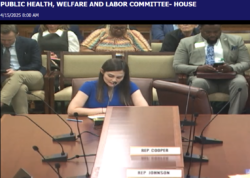
About the Bill
SB217 | Sen. Clint Penzo and Rep. Mary Bentley | Senate Committee on Public Health, Welfare and Labor
This bill would require the Department of Human Services (DHS) to request a waiver that would allow Arkansas to exclude from the Supplemental Nutrition Assistance Program (SNAP) any payments for candy and soft drinks.
AACF Testimony on April 15, House Committee on Public Health, Welfare and Labor
Good morning, Mr. Chair and members of the committee. My name is Christin Harper. I am with Arkansas Advocates for Children and Families. We work to make sure that children and families have the resources and opportunities they need to thrive, and I’m here to ask you to vote no on SB217.
As I shared earlier this week, Arkansas has the highest food insecurity rate in the nation at 18.9%, compared to 13.5% nationally. The Supplemental Nutrition Assistance Program (SNAP) is a critical tool in reducing food insecurity for low-income individuals and families.
We understand that the goal of SB217 is to help SNAP recipients make healthier eating choices — and, in turn, improve overall health outcomes — by requesting a waiver from USDA to exclude candy and soft drinks from the SNAP Program. While we appreciate the positive intent, this bill would be an example of unnecessary government involvement in families’ daily choices, and it also misses the mark when it comes to ensuring better health outcomes for low-income families.
Previous attempts to restrict SNAP purchasing ability at the national level and in other states have been rejected due to administrative complexity and ineffectiveness of addressing food insecurity. To update retailers’ checkout systems to comply with the waiver, if approved, would be costly and confusing. The definitions have been removed from this bill, so it may prove difficult to uniformly categorize food items. For example, would diet soda or Coke Zero be excluded? A lot of candy bars are made of chocolate and nuts, but so are a lot of granola bars, which can provide a source of relatively low-cost energy.
Even if the definitions would be addressed in the forthcoming waiver request, what is perhaps more important is that research shows that incentive-based approaches are more successful in promoting healthier diets without restricting SNAP recipients’ autonomy. These include programs like Double Up Food Bucks which offers incentives to purchase fresh produce at farmers’ markets and participating grocery stores, and nutrition education programs that encourage healthier food choices. Restricting food choices not only undermines SNAP recipients’ autonomy but also their dignity. Instead of restricting food choices, the focus should be on addressing root causes of poor health outcomes like poverty, unstable housing, access to healthy food and transportation so that people can travel to grocery stores, as opposed to convenience stores, as well as travel to receive preventative medical care.
Research shows that grocery shopping habits and diets of SNAP participants are statistically similar to those of other households. In other words, SNAP users do not purchase junk food at significantly higher rates than everyone else. As a result, excluding soft drinks and candy from SNAP is not going to make a large difference for overall health outcomes in Arkansas, especially when you consider that on average only about 10% of Arkansans receive SNAP benefits.
Again, we know the intent of the bill is good, but we don’t think restricting choices is going to achieve the intended goal. The focus should be on expanding resources and promoting access to healthier food rather than restricting families’ choices. Please vote no on SB217. Thank you.
